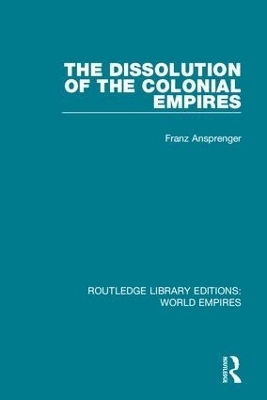
The Dissolution of the Colonial Empires
Seiten
2018
Routledge (Verlag)
978-1-138-49541-8 (ISBN)
Routledge (Verlag)
978-1-138-49541-8 (ISBN)
First published in 1989. Concentrating in particular on the British Commonwealth and the French colonial empire, the author shows how economic and political changes in the mother countries, the awakening national consciousness of the African and Asian peoples, and the effects of two World Wars had all compelled Europe to decolonize.
First published in 1989. On the eve of the First World War, almost 72 million square kilometres of territory and more than 560 million people were under colonial rule. By 1980 the European colonial empires had disappeared from the map. Concentrating in particular on the British Commonwealth and the French colonial empire, the author shows how economic and political changes in the mother countries, the awakening national consciousness of the African and Asian peoples, and the effects of two World Wars had all compelled Europe to decolonize. He argues that although a satisfactory new order in world politics and the global economy has not been achieved in the process, the dissolution of the empires came about with remarkably little bloodshed, thereby laying a solid foundation for the future.
The author concludes by looking at the legacy of the decolonized world in the late 1980s. He examines the last bastion of European colonial domination (South Africa) and discusses the emerging new North-South relations.
First published in 1989. On the eve of the First World War, almost 72 million square kilometres of territory and more than 560 million people were under colonial rule. By 1980 the European colonial empires had disappeared from the map. Concentrating in particular on the British Commonwealth and the French colonial empire, the author shows how economic and political changes in the mother countries, the awakening national consciousness of the African and Asian peoples, and the effects of two World Wars had all compelled Europe to decolonize. He argues that although a satisfactory new order in world politics and the global economy has not been achieved in the process, the dissolution of the empires came about with remarkably little bloodshed, thereby laying a solid foundation for the future.
The author concludes by looking at the legacy of the decolonized world in the late 1980s. He examines the last bastion of European colonial domination (South Africa) and discusses the emerging new North-South relations.
Franz Ansprenger
Introduction; Part One: Europe as Master of the World, 1918-39; 1. The First World War 2. The British Commonwealth 3. The Greater France of the Third Republic 4. The Netherlands, Belgium, and Portugal 5. Fascist Italy in Close Pursuit 6. Supra-Regional Colonial and Anti-Colonial Movements; Part Two: Europe’s Withdrawal from Asia and Africa; 7. The Second World War and the Colonies 8. The Multiracial Commonwealth 9. French Decolonization 10. The Loss of the Dutch and Belgian Colonial Empires 11. Spain’s Withdrawal and Portugal’s Expulsion from Africa 12. The Prospects in 1988; Appendices; Notes; Suggestions for Further Reading; Bibliography; Index
| Erscheinungsdatum | 19.07.2018 |
|---|---|
| Reihe/Serie | Routledge Library Editions: World Empires |
| Verlagsort | London |
| Sprache | englisch |
| Maße | 156 x 234 mm |
| Gewicht | 625 g |
| Themenwelt | Geisteswissenschaften ► Geschichte ► Allgemeines / Lexika |
| Geisteswissenschaften ► Geschichte ► Allgemeine Geschichte | |
| Geschichte ► Teilgebiete der Geschichte ► Wirtschaftsgeschichte | |
| ISBN-10 | 1-138-49541-7 / 1138495417 |
| ISBN-13 | 978-1-138-49541-8 / 9781138495418 |
| Zustand | Neuware |
| Haben Sie eine Frage zum Produkt? |
Mehr entdecken
aus dem Bereich
aus dem Bereich


